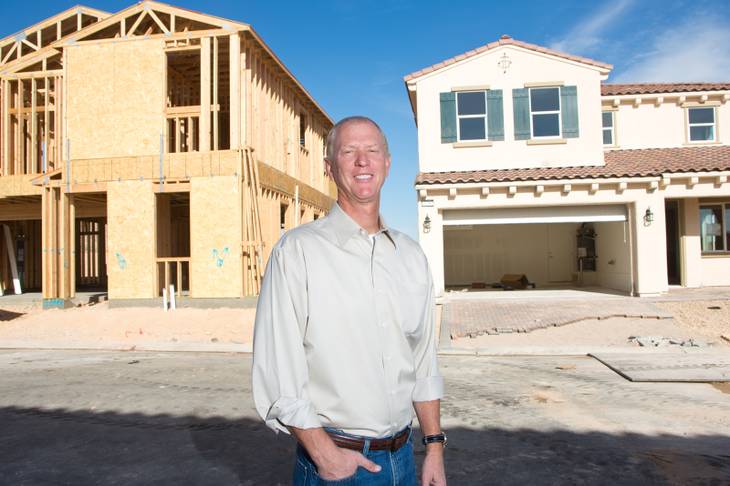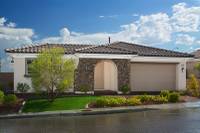Related content
Homebuilder Robb Beville is a rare breed in Las Vegas: He works for a local company.
The valley’s home construction market is dominated by out-of-state, publicly traded builders that are worth billions of dollars, employ thousands of people and sell tens of thousands of homes nationwide each year. They include Miami’s Lennar Corp., Texas’ D.R. Horton and Los Angeles’ KB Home.
Beville, president of Las Vegas-based Harmony Homes, has 55 employees and sells about 400 homes a year.
Harmony is one of a few local, privately held builders with sizable market share. Las Vegas used to have more of them, but they got wiped out by the recession.
Southern Nevada developers sold 5,672 new homes this year through mid-November, according to Home Builders Research. Harmony sold 362 houses during that time, comprising 6 percent of the market.
Homeowners typically don’t care who builds their house. But they often buy from national builders, who can muscle aside smaller rivals with robust marketing campaigns and better sales incentives.
“They’ve got deeper pockets,” Home Builders Research President Dennis Smith said.
Beville, a 51-year-old Las Vegas native, spent the boom years working for a national builder. He was Las Vegas division president for Scottsdale, Ariz.-based Meritage Homes from 2002 to 2008. He joined Harmony in 2009, a year after it was founded by developer Jim Rhodes.
What’s it like to compete with big, national builders?
Probably the single biggest advantage we have is our flexibility. We don’t have to run decisions up to land committees or regional sales managers or regional marketing people. If we want more signs or more flags or an ad in the newspaper, we just do it. We can respond real quickly.
Public companies spend an inordinate amount of time branding themselves. For us, we’re very frugal with our dollars. We don’t have the balance sheet that those guys do. Every dollar we spend, it really has to be impactful.
What advantages do their deep pockets afford?
They can have more open communities than I can have. That’s what gets them the market share. They have more money, so they can buy more land.
As a private guy, I have only so much equity to play with, so I don’t necessarily have the ability to go out there and expand my community count as easily and quickly as they do. I use the capital I have, generate a profit hopefully and then roll it into new acquisitions. It’s a much more challenging business plan.
How so?
The timing never works. You’ve got to sell all the homes in a community, build up the proceeds and spend it on a new community.
Public builders, they go to corporate and put a plan together that says they want to grow to 25 communities. They tell them what kind of capital they’re going to need, and it gets allocated. All of my communities have to perform, and if not, I feel the impact of that.
But I really think my advantage is how quickly I can respond to things. We have a project near Durango Drive and U.S. 95 in the northwest valley. We bought it from a bank that had foreclosed on the previous builder. It was easy to get an architect, design new products and build new models. The decision was made within a day or two. If it were corporate, they’d want a marketing package, they’d want to know everything about that community — why it’s not selling, who are the buyers, what are the demographics — and they would have a stack of paperwork. Then it would go up to a committee, and they would look at it. It’s a much slower process.
The valley’s home construction market softened in recent months with fewer sales and permits, but overall, business is a lot better than in 2012. What do you think next year will bring?
I think we’ll stay relatively flat. I’m not projecting any big changes. If we can get 4 to 5 percent price appreciation for the whole year, I’d be really happy.
Builders have been increasing incentives lately. Is that because sales are slowing?
It’s two things. It’s either a slowdown in sales, or they need to move inventory fast because they’re coming up to the end of the quarter or year and need to boost their earnings results.
Can public builders sell homes cheaper than you because they’re bigger?
They can. Where they really benefit is in buying materials. If they’re building homes with, say, Kohler fixtures, they’ve got a national account that buys thousands upon thousands. That’s purchasing power, so they get a better price. It lets them either drop the sales price on homes or pay more for land.

